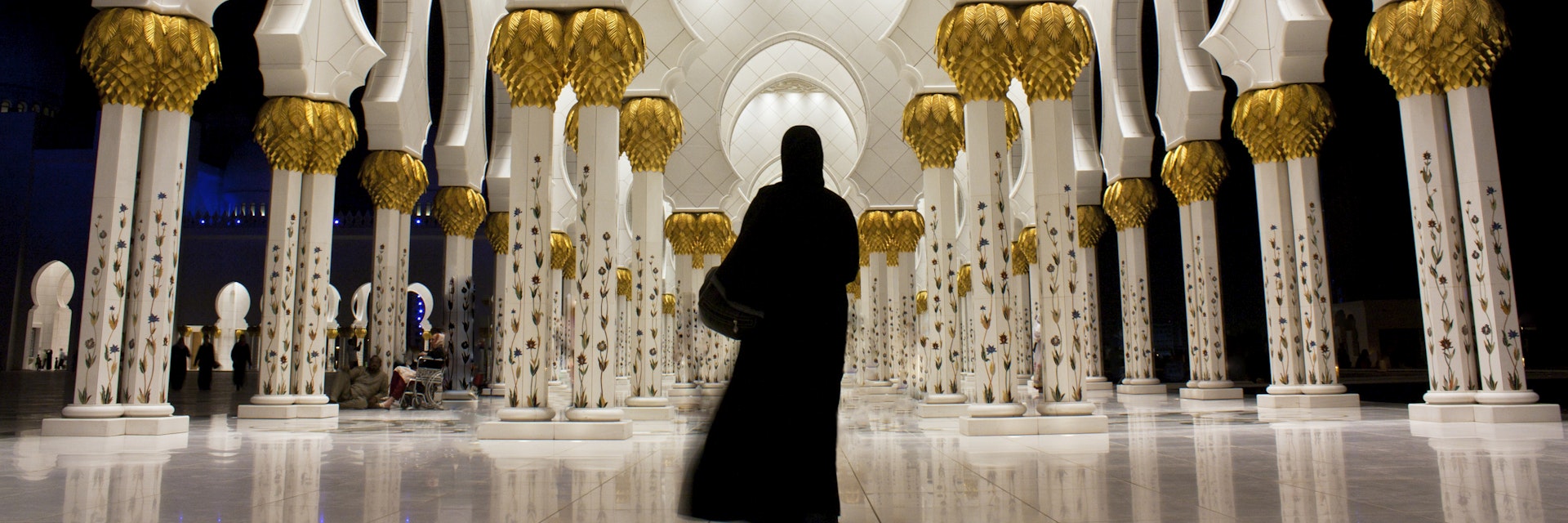Rising majestically from manicured gardens and visible from the bridges joining Abu Dhabi Island to the mainland, the Sheikh Zayed Grand Mosque is an impressive welcome to the city. With more than 80 marble domes on a roof-line held aloft by 1000 pillars and punctuated by four 107m-high minarets, it's a masterpiece of modern Islamic architecture and design.
Conceived by Sheikh Zayed, and marking his final resting-place, the mosque is one of the few in the region open to non-Muslims.
More than 90,000 tonnes of pure white marble from the Republic of Macedonia were used in its construction. Delicate floral designs inlaid with semi-precious stones, such as lapis lazuli, red agate, amethyst, abalone, jasper and mother-of-pearl, decorate a variety of marbles and contrast with the more traditional geometric ceramic details.
While it includes references to Mamluk, Ottoman, Fatimid, Moorish and Indo-Islamic styles, the overwhelming impression is contemporary and innovative. In the interior, three steel, gold, brass and crystal chandeliers fill the main prayer hall with shafts of primary-coloured light. The chandeliers, the largest of which weighs approximately 11 tonnes, sparkle with Swarovski crystals and shine with 40kg of 24-karat galvanised gold.
One of the prayer hall's most impressive features is the world's largest loomed carpet fashioned from Iranian cotton and New Zealand wool and flown in from Mashad, Iran, on two aeroplanes. The medallion design with elaborate arabesque motifs took 1200 craftspeople two years to complete, half of which was spent on hand-knotting the 5700 sq metres of woollen thread on a cotton base. That translates as 2.268 billion knots!
Visitors are welcome to enter the mosque except during prayer times. A worthwhile free 45-minute guided tour (in English and Arabic) helps explain some fundamentals of Islam while pointing out some of the stylistic highlights of the interior (otherwise comprehensive audio tours are available in 11 languages). Check the website for prayer times, which change daily. Mosque etiquette requires all visitors to wear long, loose-fitting, ankle-length trousers or skirts, long sleeves and a headscarf for women. Those not dressed appropriately are asked to go into a changing room at security, where hooded abayas (a robe-like dress worn by women) and kandouras (casual shirt-dress worn by men and women) can be borrowed for free.
Sheikh Zayed's mausoleum is on the approach to the mosque entrance, though only sitting presidents are allowed to enter. Prayers are continually recited by attendants here in one-hour shifts 24/7 (the cycles takes 1½ to two days to complete). While photographs of the mausoleum are not permitted, visitors are free to photograph all other parts of the mosque, but sensitivity should be shown towards those in prayer. There is a good cafe and a gift shop inside the complex on the mosque's northern side.








